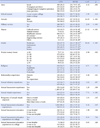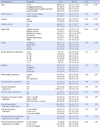Abstract
Purpose
This study was conducted to identify awareness levels and influencing factors of sexual harassment and gender egalitarianism among college students.
Methods
This study was based on a questionnaire survey with a total of 1,244 college students. The copies of the questionnaire were collected from November 2 to December 20, 2011.
Results
The average level of sexual harassment and gender egalitarianism among students from the Youngnam province was higher than those of other province. The average level of the sexual harassment and gender egalitarianism among those students who were majoring in healthcare sciences was higher than that among those who were majoring in other subjects than arts and sports sciences. The influencing factors on the recognition of gender egalitarianism were genders and sexual experiences. The influencing factors on the recognition of sexual harassment were genders and ages.
Figures and Tables
References
1. Fitzgerald LF. Paludi MA, editor. Sexual harassment: The definition and measurement of a construct. Sexual harassment on college campus: Abusing the Ivory Power. 1996. 2nd ed. New York: State University of New York Press.
2. Ha HS. Sexual harassment coping style of university students. Korean J Couns Psychother. 2007. 19(3):785–800.
3. Ha HS. Process analysis of negative emotion on sexual harassment prevention education on campus: Focused on faculty education. Asian J Educ. 2010. 11(1):25–43.
4. Im DJ. A study on cognition of sexual harassment in workplaces. 1999. Seoul: Kookmin University;Unpublished master's thesis.
5. Jung HM. The awareness and related factors of university students on sexual harassment. J Korean Soc Matern Child Health. 2003. 7(2):277–287.
6. Kim JY, Ahn CS. A study on Korean gender egalitarianism among high school students. Korean J Child Health Nurs. 2000. 6(3):329–343.
7. Kim EJ. A study on university studies sense of sexual equality. 2001. Dejeon: Mokwon University;Unpublished Master's thesis.
8. Kim MH. The effects of MBTI based self growth program on ego identity, self efficacy and interpersonal relations ability in nursing students. 2005. Seoul: The Catholic University of Korea;Unpublished doctoral dissertation.
9. Kim MJ, Kim HO. Gender inequality by women spiritual leader of four major religions in Korea. J Gend Equal Stud. 1998. 2:269–304.
10. Kim OH. An analysis of sexual harassment policies in public organization: A centering Northern Kyungbuk province. 2001. Andong: Andong National University;Unpublished master's thesis.
11. Kim YH, Jung KA. Korean Gender Egalitarianism Scale; KGES. 1999. Seoul: Korean Women's Development Institute.
12. Kim YH, Kang HW. A study on gender equalitarianism of Kyounggi university students. J Citiz Humanit. 2009. 16(1):127–164.
13. Korean Educational Development Institute. University statistics. 2011. Retrieved, January 20, 2012. from http://cesi.kedi.re.kr/index.jsp.
14. Ko YS. A study on male and female university students' sexual attitude and sexual behavior. 2009. Seoul: Ewha Womans University;Unpublished master's thesis.
15. Kwak YC. A study on sexual harrassment policy in the military. 2007. Korea: Kyung Hee University;Unpublished master's thesis.
16. Lee EW. Impacts of the affective intelligence, self-efficacy and psychological wellbeing of university students on the college life adaption. 2005. Daegu: Keimyung University;Unpublished master's thesis.
17. Lee JS. A recognition of sexual harassment in the office according to source of variation. 2002. Seoul, Korea: Sangmyung University;Unpublished master's thesis.
18. Lee YR, Kim MJ. A transition of health habits and self-rated health status of women aged in early adulthood. J Korean Acad Public Health Nurs. 2009. 23(2):199–206.
19. Lee SK, Song JE, Kim S. Experience and perception of sexual harrassment during the clinical practice of Korean nursing students. Asian Nurs Res. 2011. 5(3):170–176.
20. Moon HK. Effects of education program on preventing sexual harassment for college students. 2009. Seoul: Sangmyung University;Unpublished doctoral dissertation.
21. Moon EO. A study on sexual behavior and attitudes among college students in Seoul. J Korean Soc Health Educ. 1997. 14(2):95–112.
22. Park KJ, Kim DW, Kim SH. Research on college students' experience of sexual harassment and sexual assault. J Stud Guid. 2005. 26:307–342.
23. Park SH, Ha HS, Kim BM. Research on sexual harassment, sexual abuse and activating strategies of preventive education in university (policy reports 2007-commission-14). 2007. Seoul: The Ministry of Education and Human Resources Development.
24. Pyo SY. Educational law: Theory, Policy, Precedent. 2008. Seoul: Bakyoungsa.
25. Son HG. Ego identity formation and identity crisis in college students. 1992. Seoul: Yonsei University;Unpublished doctoral dissertation.
26. Son A, Chun S. Comparing sexual attitude, sexual initiation and sexual behavior by gender in Korean college students. Health Soc Sci. 2005. 18:73–100.
27. Yoo MS, Park JW, You MA. The relationships among gender egalitarianism, sexual attitudes and sexual harassment myths among Korean university students. J Korean Soc Matern Child Health. 2012. 16(1):14–22.




 PDF
PDF ePub
ePub Citation
Citation Print
Print







 XML Download
XML Download